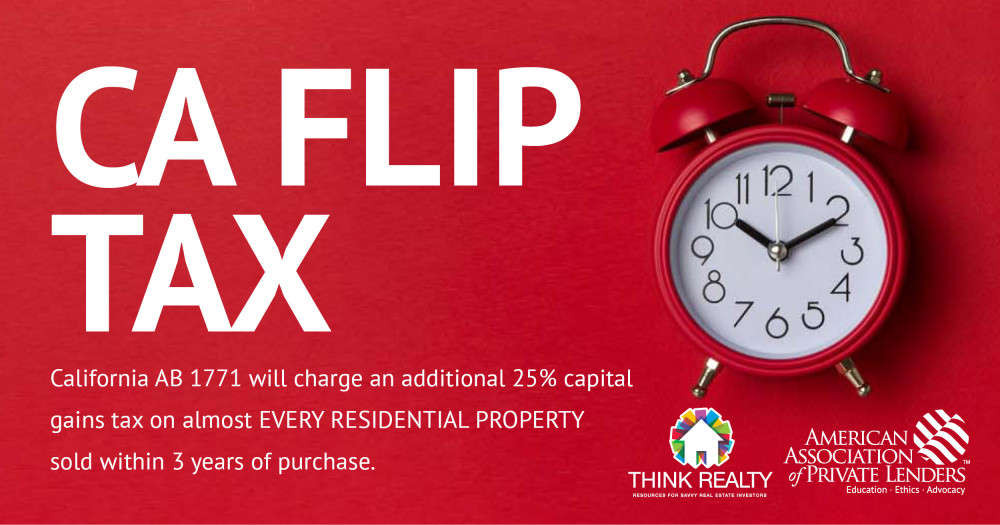This year, AAPL’s Government Relations Committee (GRC) has tackled a wide range of issues on behalf of the private lending community.
In New York, Senate Bill S3060E sought to increase the transfer tax on fix-and-flip residential property by 15% to 20%. The bill saw no movement this year, although
it is unclear if it was tabled due to AAPL’s opposition efforts or the coronavirus.
Then, the Securities and Exchange Commission cited the recommendations of AAPL and its general counsel, Geraci LLP, in its final ruling to expand the definition of “accredited investor.” The final rules are expected to create an influx of new investors for private equity funds, venture capital funds, private companies, and specific hedge funds within the industry.
Although COVID-19 stalled most “business-as-usual” legislation in state legislatures, it created additional challenges as regulators scrambled to mitigate its health and economic impacts. Among the most extreme was California Assembly Bill 1436, which would have extended mandatory 12-month forbearance to any requesting residential mortgage borrower. Due to the efforts of AAPL, Geraci LLP, and other reputable mortgage associations, the omnibus AB 3088 that replaced AB 1436 did not include these measures.
AAPL’s GRC continues to keep an eye on state and federal legislation that seeks to overstep reasonable COVID-19 mitigation efforts. In the meantime, as we slowly move beyond the reactionary coronavirus regulation, we asked the committee members to tell us what they see as the largest legislative challenge facing the private lending industry. Here are their answers.
Cortlandt Chalfant
- Managing Member, Nexus Private Capital
- GRC Region: Four Corners (AZ, CO, NM, UT)
The biggest legislative challenge for the private lending industry is “regulation creep”
and the corresponding risks of “unintended consequences.”
Government generally can’t resist the temptation to regulate. Unfortunately, all too often a “shotgun” approach is used to fix a “rifle-shot” issue. As a result, much of the good that comes from addressing the target is diluted by collateral damage.
You can pick many topics to make this point. In New York, for example, a residential resale tax was proposed that would impose a 20% tax on the gross sales price of any home resold within one year and 15% if resold within two years. This transfer tax would have eliminated an entire supply chain of fix-and-flip investors while doing nothing to promote affordability.
Nema Daghbandan
- Partner, Geraci LLP
- GRC Region: West (AK, CA, NV, OR, WA)
“To a man with a hammer, everything looks like a nail.” ~Author Unknown
The lesson of the 2008 mortgage crisis for lawmakers is to act early, intervene forcefully, and protect individuals from being kicked out of their homes. The intention behind this lesson makes perfect sense and protects the most vulnerable in their time of greatest need.
But, in the rush to act early and powerfully, the legislatures are unable to differentiate between those most vulnerable (i.e., homeowners in their homes) and those who decided to take a business risk and should live with the consequences of that risk.
Unlike many sectors of the economy that are struggling and will not be propped up by government intervention (think: hospitality, restaurants, nail salons, gyms, etc.),
legislative bodies are attempting to stop all mortgage enforcement activities, effectively
eliminating a lender’s recourse regardless of whether the borrower is experiencing a hardship. This “kick the can” approach will have its own day of reckoning. Unfortunately, when picking winners and losers, private lenders are pulling the “short straw” legislatively.
Edwin Epperson
- Owner, Blue Bay Capital
- GRC Region: Southeast (AL, AR, FL, GA, LA, MS)
As the current political tensions are causing civil unrest and the government is responding with seemingly knee-jerk reactions, investor, tenant, mortgagor, and lender rights are the biggest concern, now and for the foreseeable future. Proper representation is critical now. So, communicating the concerns of your local real estate investing community to the GRC is more important now than ever.
Mike Fallot
- CEO, MM Lending, LLC
- GRC Region: Great Lakes (IL, IN, KY, MI, OH, TN, WI)
The U.S. faces a significant shortage of both housing units and affordable housing. Private lenders across the country provide a large portion of the capital real estate investors need to acquire distressed property and complete the major repairs needed to make the property livable.
Private lenders play a vital role in rebuilding the housing inventory because they provide the funding for these higher risk loans quickly and efficiently.
As elected officials at every level grapple with the housing shortage, they have proposed legislation that would regulate private lenders and add excessive taxes on real estate sales deemed to be “flips.” Many legislators do not fully understand the role private lenders play in expanding the housing market. As a result, most proposals would have significant, unintended consequences that would reduce the amount of investment available for housing and reduce the available housing inventory.
Matthew Gunter
- Assistant General Counsel, RCN Capital
- GRC Region: Northeast (CT, ME, MA, NH, NJ, NY, RI, VT, DC)
The greatest challenge is one that has yet to be taken seriously: deweaponizing bankruptcy, or using it in bad faith, as a delay tactic in foreclosure—at least with respect
to business purpose loans and single-purpose entities. Private lenders, big and small, can take a big financial hit with a single loan that enters bankruptcy protection. Most
of these filings occur on the eve of (or the morning of) a foreclosure sale, delaying the sale by months, at a minimum. To private lenders, it causes major inconvenience and
loss of a larger proportion of revenue than compared to a bank or others more able to absorb the blow. To the legal system and the country as a whole, these filings degrade
and impair the ability of the bankruptcy courts to efficiently mete out real justice.
Chris Ragland
- Real Estate Investor and Mentor
- GRC Region: Near West (ID, MT, OK, TX, WY)
Legislation at all levels is being crafted and passed rapidly without extensive input.
As a result, private lenders are being unfairly categorized and grouped with major lenders, who are focused on homeowners as opposed to commercial purpose loans.
This blanket approach to legislation is the single largest risk to the private lending sector in recent memory. It is vital, as an association, that we continue to advocate, educate, and participate when it comes to sensible and responsible legislation.












Leave A Comment